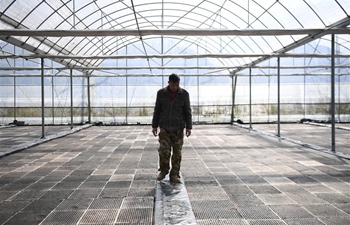TOKYO, March 11 (Xinhua) -- Eight years after one of the worst nuclear disasters in history, the Japanese government and the utility it is responsible for are still battling the crisis which has yet to be brought under control.
The lack of progress is not just reflected in there being no clear roadmap for the decommissioning of the stricken Daichi nuclear power plant in Fukushima Prefecture, but can also be seen in an ongoing social crisis.
Thousands are still struggling in temporary housing and unable to reboot the once flourishing businesses, in regions hardest hit by the nuclear crisis, which was triggered by a massive 9.0-magnitude earthquake and ensuing tsunami severely damaging three reactors at the Daiichi facility.
The damaged reactors suffered core meltdowns after their key cooling systems were knocked out and backup power supplies were rendered useless.
Tokyo Electric Power Company Holdings Inc. (TEPCO), operator of the still crippled Fukushima plant, has since successfully decommissioned the Number 5 and Number 6 reactors at the plant, and removed a significant number of fuel rods in the Number 4 reactor and safely stored them.
But, TEPCO has struggled to come to terms with removing the melted nuclear fuel and debris from the Number 1 to Number 3 reactors, which is making an overall blueprint for the plant's decommissioning a seemingly impossible task for the government.
TEPCO has recently attempted to make direct contact with the melted fuel at the bottom of one of the crippled reactors by using a robotic device that can grip onto objects.
But while the device was able to make contact with the fuel, it was unable to confirm whether the accumulated fuel could be extracted or not.
Prior to this, the embattled utility had said that even with the device's supposed capacity to grip objects weighing up to 2 kg and carry a camera and a radiation detector, it will not extract a sample of nuclear deposits until the second half of next fiscal year.
Past attempts to conduct surveys in the crippled reactors have involved TEPCO sending self-propelled robots to explore the inside of the reactors and capture and send information about the melted nuclear fuel debris so that the utility can decide how to remove it.
An attempt to send a shape-shifting, camera-equipped robot into the reactor was cancelled, however, as camera images outside the containment vessel used to monitor the robot could not be seen on the control room's screen.
Prior to this, a similar failed attempt to retrieve data from inside the damaged Number 2 reactor occurred due to the robot malfunctioning, likely due to exceedingly high levels of radiation.
The continued failures by TEPCO to retrieve the necessary data on the high levels of radiation, the temperature, and the amount and locations of melted fuel and nuclear debris from the damaged reactors, are complicating plans to decommission the plant.
TEPCO and the government have said in their most recent analysis of the situation that the exact plan as to when and where to begin the decommissioning process has yet to be decided.
The decision on which reactor will be the first to have its spent nuclear fuel removed will be decided within fiscal 2019, they had initially said.
The removal of the spent fuel, assuming suitable technology can be developed, is expected to start in 2021, the government and the utility have tentatively decided.
Independent experts on the matter, however, believe that this timeframe is overly optimistic considering the sluggish pace at which the utility and government have been moving up until now to overcome key problems at the plant.
In addition, TEPCO, since the crisis began to date, is still grappling with storing contaminated water at the facility, as coolant water is continually being poured over the radioactive debris, yet is mixing with groundwater which flows into the facility from the plant's surrounding hills.
The contaminated groundwater has been allowed to flow freely into the Pacific Ocean, much to the consternation of the international community who remain skeptical about TEPCO's reporting of radiation levels, owing to a number of bungled practices and cover-ups widely reported over the past eight years.
Japan's nuclear authority has said that once the contaminated water from the plant has been diluted enough, it will be released into the Pacific Ocean, yet no roadmap or deadline for the procedure, which is staunchly opposed by local fishing industries, has been put forward.
The overall decommissioning of the plant, hence, is expected to take decades.
Meanwhile, the government-backed ceremony held on Monday at the National Theater in Tokyo, where a moment's silence was observed to remember the victims of the disaster, likely did little to instill faith in the 50,000 evacuees who have been unable to return to their homes because of the disaster, which, overall claimed the lives of a confirmed 15,897 people.
According to the latest figures, around 47,000 people were forced from their homes in the days and weeks following the triple disasters, and 2,533 are still considered missing or unaccounted for.
Another 3,701 have died owing to post-disaster health conditions, the National Police Agency here said, as of March 8.
Regarding the current 50,000 evacuees, construction of new housing projects has, unfathomably, yet to be completed.
The government has said it will disband the Reconstruction Agency that was formed a year after the disasters to ensure that reconstruction work was proceeded in a coordinated and consolidated fashion.
However, according to local media, in the hardest-hit prefectures, around 1,300 people are still living in temporary accommodation as there have been delays in the building of new residences.
The delays have been caused by the allocation of funds for such projects not being handled effectively and further stalled due to bureaucratic issues, as well as those of a fraudulent nature.
Compounding such myriad problems on a social level, is the fact that eight years now marks the time for loans given out by municipalities to help individuals and local businesses rebuild to be paid back.
Owing to the stigmas still associated with radiation, those who did move back to areas once affected by the meltdowns, particularly those working in the farming or agricultural businesses, have struggled to find their feet, due to bans and external concerns about produce coming from Fukushima.
In addition, in Fukushima, there are a number of municipalities that are still deemed uninhabitable and remained cordoned off as radioactive waste continues to be piled up on the sides of the streets.
This is after hustled clean up operations, in the first few years after the plant's meltdowns, saw contaminated waste hastily stored in thin black plastic bags with plans for their treatment and proper disposal still, as yet, undetermined.












